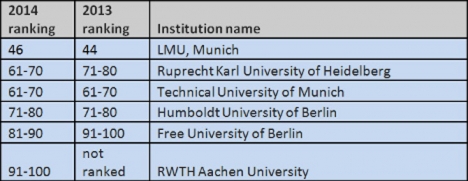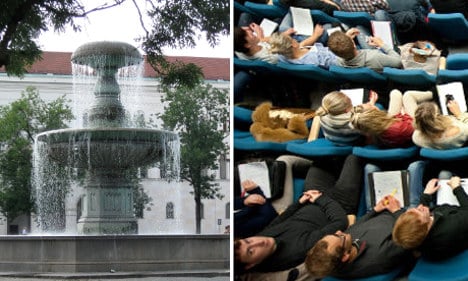The reputation rankings show Germany now has six of the world’s 100 most prestigious universities, up from four in 2012 and five last year.
Germany was the country with the third highest number of universities in the top 100, behind the US which dominated the rankings with 46 and the UK which had ten.
Aachen's RWTH entered the top 100 for the first time, rising from 129th place last year. It follows the Free University of Berlin which made it onto the list in 2013.

Phil Baty, editor of Times Higher Education Rankings, told The Local that Germany could look forward to further improvement in future years if its universities “internationalized” by offering more courses in English and opening branches abroad.
“There is probably still a problem around language especially to get German research fully appreciated [abroad],” he said.
But government efforts to increase competition and focus resources were starting to pay off, he said.
“This is encouraging news as improvements in teaching and research quality drive improvements in reputation, which in turn drive further improvement as more highly esteemed institutions attract more international talent, partners and investors," Baty said. "It is a virtuous circle that could serve Germany well.”
READ MORE from The Local's Education section here
Although Germany's number one institution the Ludwig-Maximilians-Universität (LMU) in Munich slipped from 44th to joint 46th, all other German institutions either held their places or rose in the rankings.
Germany’s fortunes contrast dramatically with France’s. Two French institutions fell out of the top 100, leaving the country with just two representatives.
READ MORE: Reputations of French universities tumble
It was also a bad year for Sweden which now has just one university in the top 100 after two dropped in the rankings.
Uppsala University and Lund University fell out of the top 100, leaving just the Karolinska Institute, outside of Stockholm, to fly the Swedish flag.
The rankings are compiled from an opinion-based survey which attracted over 10,500 responses from published senior academics.
"A university’s reputation for academic excellence is absolutely vital to its success," added Baty.
“It drives student and faculty recruitment, international research partnerships, and helps to attract philanthropy and industrial investment.
“And while reputation is based on subjective opinion, in this case it is the informed, expert opinion of those in the know: experienced scholars from around the world.”



 Please whitelist us to continue reading.
Please whitelist us to continue reading.
Member comments